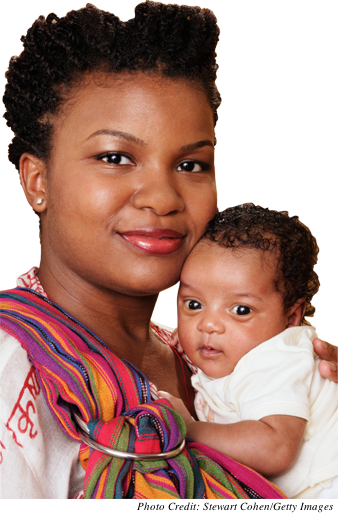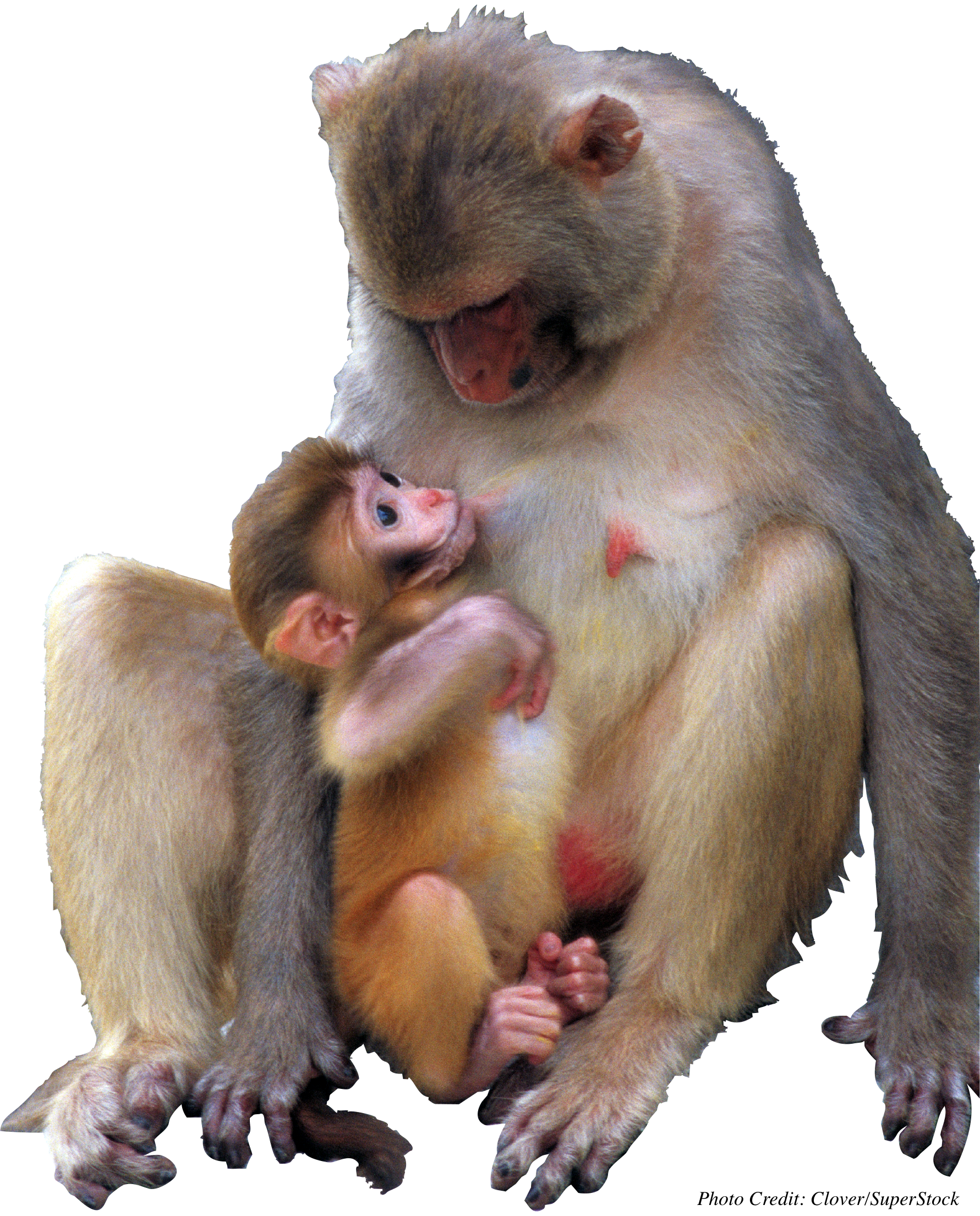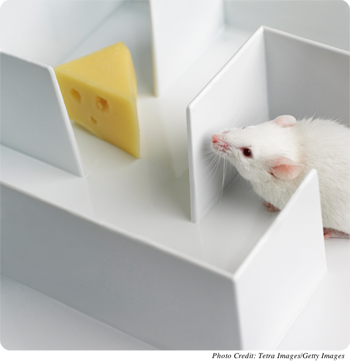MOTHER LOVE: THE WORK OF HARRY HARLOW
Slide 1 of 14: Synopsis

Author
Victoria Cross, University of California – Davis
Synopsis
This activity focuses on the work of Harry Harlow and contains much original footage from 1959. After considering the concept of the infant-mother bond and some of the ethical considerations around studying this topic, you will review the dominant theories and observe the set up and experiment results of Harlow’s actual study.
Slide 2 of 14: What Is an Infant’s Love for Its Mother?

Take a moment to think about the strong emotional bond or attachment that forms between most infants and their parents.
The primary caregiver is the person or people who care for an infant. This person can be of either gender and need not be biologically related to the infant. For the most part, the research of the past 50 years has focused on mothers as the primary caregivers. Since this activity features Harry Harlow’s historically significant work from 1959, this activity will focus on the bond between the infant and its mother.
Slide 3 of 14: Studying an Infant’s Love for Its Mother: Ethical Considerations

Conducting research on something as delicate as an infant’s love for its mother is an area that is rife with ethical considerations and concerns. For example, no institutional review board would allow a researcher to remove an infant from its mother in order to study the impact on the emotional bond.
However, the topic is very important in understanding human development. Therefore, researchers must consider alternate ways of answering their research questions without violating research ethics or participants’ trust.
One option would be to take advantage of naturally occurring situations in which infants and their primary caregivers are separated. Such naturally occurring situations may include adoption, foster care, and hospitalization.
Another option would be to select an animal model that resembles humans in the behavior being studied. Conducting research on animals allows researchers to exert more control over the experiences of the animal than can be exerted over humans.
However, the challenge is that no animal completely resembles humans so any information gathered from animal research might not generalize to human behavior.
Slide 4 of 14: An Introduction to Harlow’s Work
- Chapters
- descriptions off, selected
- captions settings, opens captions settings dialog
- captions off, selected
- English Captions
This is a modal window.
Beginning of dialog window. Escape will cancel and close the window.
End of dialog window.
This is a modal window. This modal can be closed by pressing the Escape key or activating the close button.
This is a modal window.
Play this video from 1959 to listen to Harry Harlow introduce his work with infant rhesus monkeys.
Slide 5 of 14: Introduction to Harlow’s Work: Historical Context
- Chapters
- descriptions off, selected
- captions settings, opens captions settings dialog
- captions off, selected
- English Captions
This is a modal window.
Beginning of dialog window. Escape will cancel and close the window.
End of dialog window.
This is a modal window. This modal can be closed by pressing the Escape key or activating the close button.
This is a modal window.
In the clip that you just watched, Harlow states, “Some people believe that this bond is built upon nursing.” This statement is a direct reference to behaviorism, which was a dominant theory in psychology from the 1930s through the 1960s. According to the tenets of behaviorism, behaviors that are reinforced are likely to be repeated. Food acts as the primary reinforcement because all animals need food, and research has repeatedly shown that animals will work hard to obtain food.
For an infant, establishing contact with its mother is reinforced when the infant is being fed. According to behaviorism, the infant will repeat the behaviors that bring and keep its mother close (e.g., crying, cooing and smiling while being held). Keep in mind that behaviorism does not attempt to explore the emotional component of this relationship.
Question 3.
Consider the logic of behaviorism by matching the terms and descriptions in the activity below. Select an item in the Term column, then select the item in the Description column that matches it. Keyboard instructions: Use the tab or arrow keys to scroll through the items, and the return key or space bar to select an item. Use the escape key to exit the matching activity at any time. Enter the matching activity.
Consider the logic of behaviorism by matching the terms and descriptions in the activity below. Select an item in the Term column, then select the item in the Description column that matches it.
Correct Matches:
Slide 6 of 14: Meet the ‘Mothers’
- Chapters
- descriptions off, selected
- captions settings, opens captions settings dialog
- captions off, selected
- English Captions
This is a modal window.
Beginning of dialog window. Escape will cancel and close the window.
End of dialog window.
This is a modal window. This modal can be closed by pressing the Escape key or activating the close button.
This is a modal window.
In this study, Harlow compared two characteristics while holding all other variables constant. This allowed him to separate the influences of contact comfort and nursing on the formation of the infant emotional bond. Be aware that Harlow had complete control of the characteristics of the surrogate mothers.
Slide 7 of 14: The Experiment
- Chapters
- descriptions off, selected
- captions settings, opens captions settings dialog
- captions off, selected
- English Captions
This is a modal window.
Beginning of dialog window. Escape will cancel and close the window.
End of dialog window.
This is a modal window. This modal can be closed by pressing the Escape key or activating the close button.
This is a modal window.
The infant rhesus monkeys were taken from their mothers at birth and raised in isolated cages. They each had constant access to a cloth mother and a wire mother. The infants were divided into two groups:
- Group 1: nursed on wire mother only
- Group 2: nursed on cloth mother only
Harlow analyzed the infants’ behaviors toward the surrogate mothers to evaluate the formation of the emotional attachment bond. If behaviorism accounts for the formation of this emotional bond, then the important variable would be nursing. However, if Harlow’s prediction was correct, then the primary variable responsible for forming an emotional bond would be contact comfort.
Slide 8 of 14: The Results
- Chapters
- descriptions off, selected
- captions settings, opens captions settings dialog
- captions off, selected
- English Captions
This is a modal window.
Beginning of dialog window. Escape will cancel and close the window.
End of dialog window.
This is a modal window. This modal can be closed by pressing the Escape key or activating the close button.
This is a modal window.
| Prediction from behaviorism | Harlow's prediction | |
|---|---|---|
| Nursed on wire mother | wire mother is preferred | cloth mother is preferred |
| Nursed on cloth mother | cloth mother is preferred | cloth mother is preferred |
From your predictions on the previous screen, you can see that both theories predict the same outcome for the infant rhesus monkeys that nursed on the cloth mothers. The critical comparison will be for the group that nursed on the wire mother. Behaviorism predicts that the monkeys in Group 1 would prefer the wire mother that nurses. Harlow suspected that the monkeys would prefer the cloth mother that provides contact comfort.
Play the video to observe one of the monkeys from Group 1.
Slide 9 of 14: Is This Love?
- Chapters
- descriptions off, selected
- captions settings, opens captions settings dialog
- captions off, selected
- English Captions
This is a modal window.
Beginning of dialog window. Escape will cancel and close the window.
End of dialog window.
This is a modal window. This modal can be closed by pressing the Escape key or activating the close button.
This is a modal window.
The infant rhesus monkey spends time on the cloth-covered monkey, but is this love? To explore this bond even further, Harlow devised a way to study how the infant monkeys act when they are frightened.
Play the video to find out what happened.
Harlow was particularly interested in evidence that proved that contact with the mother gives the infant security. Please note which evidence in the video clip shows that the infant gained security from contact with its mother.
Slide 10 of 14: A Secure Base
- Chapters
- descriptions off, selected
- captions settings, opens captions settings dialog
- captions off, selected
- English Captions
This is a modal window.
Beginning of dialog window. Escape will cancel and close the window.
End of dialog window.
This is a modal window. This modal can be closed by pressing the Escape key or activating the close button.
This is a modal window.
Both human and rhesus monkey infants have much to learn about the world around them. They learn by interacting with the world and exploring their environment. If exploration is disrupted, infants fail to gather information about their world and in effect, fail to learn and grow.
Infants must balance exploration with risk. An unfamiliar location is potentially dangerous, and a normal infant would be hesitant to explore it alone. A sign of a secure relationship with a primary caregiver is the ability to use that caregiver as a secure base. A secure base gives infants the confidence to explore the environment. These confident infants will occasionally check back to ensure that the caregivers are still available.
Play the video to find out if a cloth mother that has provided contact comfort and security from frightening machines can also act as a secure base in an unfamiliar location.
Slide 11 of 14: Rethink an Earlier Response

At the beginning of this activity, you wrote the following answer to this question:
Question: How do you think the infant-mother bond forms? What do you think forms the basis of an infant’s love for its mother?
Your answer: No response entered.
Slide 12 of 14: Assessment: Check Your Understanding

Slide 13 of 14: Assessment: Check Your Understanding

Slide 14 of 14: Assessment: Check Your Understanding

Activity results are being submitted...